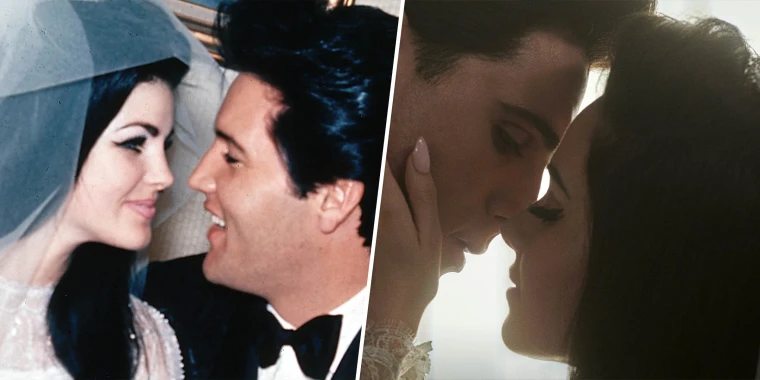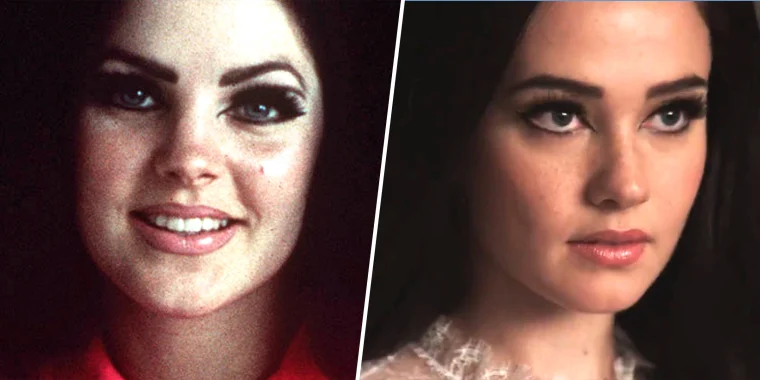Unraveling Romance: Sofia Coppola's Moody Dive into the World of Priscilla and Elvis
In Sofia Coppola's latest cinematic venture, Priscilla, the acclaimed director skillfully weaves a narrative that transcends the traditional boundaries of biopics, offering a moody and introspective exploration of the legendary romance between Priscilla and Elvis Presley.
The film strategically places a pivotal Bible passage from the Book of John within its storyline. This passage, where Jesus reveals himself to a Samaritan woman at a well, serves as a symbolic backdrop for Priscilla's journey. In the midst of pink shag carpets and Aqua Net hairspray, Elvis conducts a Bible study in his Bel Air home, reading the story to a distracted audience. This scene, drawn from Priscilla Presley's memoir, Elvis and Me, sets the stage for the nuanced exploration of their relationship.
Coppola skillfully navigates the complex dynamics of Priscilla and Elvis's union, especially considering their significant age difference when they first met. The film challenges preconceived notions and avoids labeling Elvis as a "groomer." Instead, it invites audiences to empathize with the characters, acknowledging the power dynamics while maintaining an enduring love that mirrors Priscilla's perspective.
Coppola artfully introduces layers to the narrative, portraying Elvis's struggles with grief, homesickness, and a lack of control in his own life. The omnipresent influence of Elvis's manager, the Colonel, adds depth to the film, revealing the challenges the iconic figure faced behind the scenes. The film cleverly addresses the ageless quality of their relationship, depicting them as children playing at being adults amid the backdrop of fame and adoration.
The absence of Elvis's music in the film, due to rights issues, becomes a strength rather than a limitation. Coppola subverts the sensationalized portrayal of Elvis by focusing on the human aspects of their relationship—heartbreaking romance, isolation, and control. The film masterfully explores themes that have been central to Coppola's career, including the harsh realities of coming of age, disillusionment with fame, and the complexities of desire.
While Priscilla's possessions take center stage, serving as a reflection of her objectification by Elvis, the film doesn't shy away from showcasing Elvis's opulence. The carefully curated scenes at Graceland underline Elvis's obsession with control, extending to both material items and, notably, Priscilla herself.
Cailee Spaeny's portrayal of Priscilla impressively captures the nuanced growth of a young girl into a woman, while Jacob Elordi's Elvis introduces a vulnerable and complex dimension to the legendary pop star. However, the film's pacing, affected by unforeseen budget constraints, leaves the latter part feeling rushed, detracting from the overall satisfaction of the viewing experience.
In the film's poignant conclusion, Priscilla discovers that the "heaven" offered by Elvis does not fulfill her needs. Coppola doesn't romanticize the couple's love affair but rather concludes with a somber moment, as Priscilla informs a drugged Elvis of her decision to end their marriage. The film strips away any glamorous illusions, concluding with a whimper that echoes the complexities and realities of their storied relationship.
Priscilla stands as a testament to Sofia Coppola's ability to delve into the intricacies of human relationships, transcending the boundaries of conventional storytelling. Through a moody lens, the film peels back the layers of fame, love, and control, offering audiences a fresh perspective on the enduring legacy of Priscilla and Elvis Presley.
Strike Out,
Writer: Lucia Villanustre
Editor: Isabel Wilder
Tallahassee



